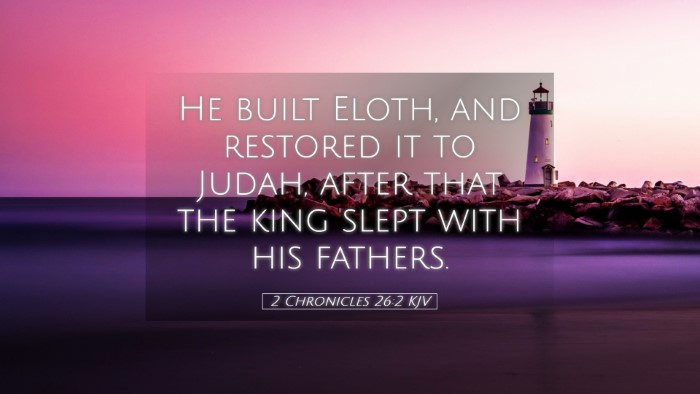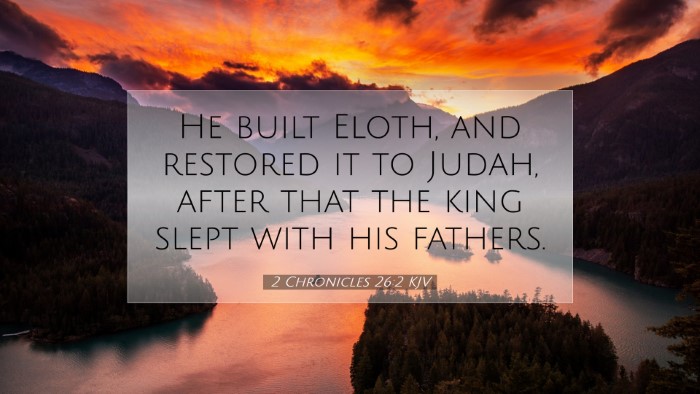Commentary on 2 Chronicles 26:2
Verse Reference: 2 Chronicles 26:2 - "And he built Eloth, and restored it to Judah, after that the king slept with his fathers."
Overview
This verse marks a significant moment in the history of Judah, highlighting King Uzziah's accomplishments and the restoration of Eloth. Uzziah's actions are seen through the lens of his faith and leadership as he rejuvenates both the territory and the cultural identity of Judah.
Commentary Insights
Historical Context
According to the public domain commentaries, Eloth was a strategic port on the Red Sea. Its restoration illustrates Uzziah’s commitment to reclaiming lost territories and enhancing Judah’s economic and military strength. Matthew Henry notes that Uzziah’s leadership coincided with a period of prosperity, and his pursuits reinvigorated the nation's pride and self-sufficiency.
Uzziah's Leadership Style
Albert Barnes elaborates that Uzziah's success stemmed from his reliance on God and the counsel of faithful advisors, particularly during his formative years. He became a mighty king, credited for building infrastructure and military prowess. Clarke emphasizes the governance style of Uzziah, describing it as adaptive and endeavoring, favoring innovative strategies to recover and develop land.
The Significance of Eloth
Eloth holds symbolic significance in this verse. Restoring it signifies not only territorial acquisition but also the re-establishment of Judah's maritime trade routes. Uzziah's rebuilding efforts were crucial in demonstrating God’s favor toward His people. Commentators agree that the restoration reflected a divinely blessed reign, where Uzziah's faithfulness directly corresponded to national prosperity.
Theological Themes
- Faithfulness: Uzziah's reign is a portrait of faithful leadership. His initiatives in rebuilding serve as an illustration of how faith is paramount in leadership roles. Scholars like Henry point out that faith necessitates action—restoration follows faith.
- Divine Favor: The verse encapsulates a truth echoed throughout scripture: God blesses nations whose leaders seek Him. Clarke insists that every decision Uzziah made, including the restoration of Eloth, stemmed from divine guidance.
- Legacy and Leadership: The passage intersects with themes of legacy. Uzziah's deeds ensured that the influences of his reign would endure beyond his time, as illustrated by the very act of restoring Eloth, which would benefit future generations.
Comparative Analysis
Commentators have pointed out parallels between Uzziah’s actions in Judah and the leadership qualities exhibited by other biblical figures. For instance, like Nehemiah's rebuilding of Jerusalem, Uzziah's restoration efforts demonstrate a historical pattern where divine leaders emerge to bring renewal to God’s chosen people.
Practical Applications
For today's pastors and theologians, this verse serves as a rich source of insight into the responsibilities of spiritual and civic leadership:
- Renewal as an Act of Faith: Just as Uzziah restored Eloth, contemporary leaders should seek to restore and enhance their communities through acts of faith and service.
- Importance of Divine Guidance: Leaders are reminded of the necessity for prayer and seeking God's will, which directly correlates to successful ministries and impactful leadership.
- Building for Future Generations: The actions taken by leaders should consider sustainable impacts, fostering environments that benefit future generations akin to Uzziah's restoration of Eloth.
Conclusion
2 Chronicles 26:2 not only chronicles a historical moment but also presents profound lessons in leadership, faithfulness, and the significance of seeking divine favor. Uzziah’s restoration of Eloth is emblematic of the capacity of leaders to effect change when divinely guided. It beckons modern believers to reflect on how their actions in leadership roles can reciprocate the blessings and guidance of God for the greater good of their communities.


